I-Me-Mine: Why I don’t (usually) collect stones
Admiration without ownership and the grief-art of letting go
Last week I was on a train to Glasgow as I began the long journey back home to California. There, I encountered the same Dutchman I’d met the previous Saturday on the ferry from Oban to Mull. He had been on his way to the Isle of Erraid, a place with minimal development that has to be crossed over to on foot at low tide because there are no roads to it. That Saturday, I was on my way to Iona, the mystical isle steeped in myth and legend which, like much of the Celtic world, turns to history at some undefined place along the human timeline. On the Glasgow train the Dutchman asked me how I had enjoyed my trip to Iona.
“Did you bring back a piece of the marble?” he asked, excitedly.
Iona marble is prized for its unique green color and is said to have healing properties. For this reason, pilgrims to the sacred isle have carried Iona marble stones all over the world for centuries.
As the Dutchman’s question settles in my mind, I am transported back to the day I walked 8.5 miles around Iona alone. The white sand beaches are dotted with multicolored stones, each polished by the waves. There, among them, the Iona marble stands out from the rest, its jade-like appearance both incandescent and opaque. As I bend to pick up a shimmering stone, I feel the tug: wanting one of my very own. After all, I have come all this way. This is a very special place. I should have a piece to take back with me to remember it by.
I turn it over in my hands. I admire it briefly, then my dogged “productivity mind” takes over. I have a lot more to see today, I think to myself; I can’t sit here and admire it forever. My brain tells my hand to put it in my pocket. I go to make the motion, but can’t, as if something is holding my hand back. It’s a strange feeling, wanting to do something but being prevented from executing it by another thought.
The pocketing feels too—and this is the precise word that comes to mind—grabby. I suddenly see myself as Tolkien’s Gollum1, obsessing over the pretty ring. “My precious…” Gollum is the embodiment of what greed and obsession with the material can do to a person’s consciousness.
I put the stone back on the sand, and feel a little pang of grief. I want to keep the stone, but I also don’t want to carry the guilt of taking something that’s not mine. I marvel at the double bind: damned if I do, damned if I don’t. I walk away to increase my distance from the rapidly unfolding situation with a tiny mineral. As I walk further down the beach, a Beatles song begins to play loudly in my head:
All through the day
I me mine, I me mine, I me mine
All through the night
I me mine, I me mine, I me mine
Now they're frightened of leaving it
Everyone's reading it
Comin' on strong all the time
All through the day
I me mine
I me me mine, I me me mine
I me me mine, I me me mine
Tell me it’s not about the rocks without telling me it’s not about the rocks
Okay, so it is and is not about the rocks. As I’ll explore in future newsletters, the pervasiveness of the I-me-mine mindset erodes many of the things you and I hold most dear. Ironically, the mindset itself exists for fear of losing these very treasures.
The good news is that mindsets are flexible, and the best way to change them is to see what needs changing. My point in telling you this story about the rocks is pretty much my point in every newsletter: sharing how I try to practice what I think will be useful ways to make small personal changes that can add up to big ones. It’s the “let it begin with me” approach over the “they are wrong, we are right” approach, which goes nowhere but straight to hell, as we are currently witnessing on the global stage.
George Harrison wrote the lyrics to “I Me Mine” in 1969, when he was fed up with John’s, Paul’s, and just about everyone else’s runaway egos. Amidst current tragedies, I’ve been finding comfort and understanding in poetry. It seems necessary to find a meaningful way to explore, however briefly, the relationship between recent events and the I-me-mine-ness. This week,
In those years, people will say, we lost track
of the meaning of we, of you
we found ourselves
reduced to I
and the whole thing became
silly, ironic, terrible:
we were trying to live a personal life
and yes, that was the only life
we could bear witness toBut the great dark birds of history screamed and plunged
into our personal weather
They were headed somewhere else but their beaks and pinions drove
along the shore, through the rags of fog
where we stood, saying I
As it is wont to do, poetry succeeds in conveying more than prose ever could.
To keep or not to keep
Some may say, What’s one stone?
It’s less (if at all) about the individual stone and more about the intention behind the taking. The guilt I feel when pocketing an object reminds me to be present and love the beauty of the stones where they are, then experience the subtle or not-so-subtle grief of leaving them behind.
The urge to take a piece of Iona home stemmed from not wanting to have to come to terms with the fact that I would be leaving soon and may never return. By taking it, I was sidestepping a very important grief process (or so I thought).
Once the talismans we’ve gathered from our journeys make their way home with us, how often do they keep their magic? I can’t tell you how many times I’ve tossed yet another set of stones in the back yard, releasing them back to the earth—if in the wrong spot—because, after they were tucked into a drawer for some indeterminate amount of time, I couldn’t remember where I got them. Through the mists of time, they had become worthless. Even if the novelty convinces me I will cherish this item forever, it soon fades, buried under the sands of the rest of the responsibilities and attention demands that compose the daily workings of my life.
As with anything, there are exceptions: I have stones in my possession from two locations. First, those given to me by a local on the shores of the Ganges River in Rishikesh, India. This did not feel greedy or grabby because they were a gift; it would have been rude to refuse them, both to the person and, I felt, to the land.
Second, on a sunny midsummer day in Michigan—the location of my birth and upbringing to early adulthood—I took a dip in Lake Huron. Swimming back to the beach, I stopped to wave to my cousin on shore (who, right before I went into the water, said, “Keep an eye out for Petoskey stones!”). I looked down at my feet, and a Petoskey stone glimmered in the sunlight beneath the surface. I knew what it was before I even picked it up.
The Michigan state mineral, Petoskey stones are unique pebble-shaped pieces of fossilized coral, plucked from the bedrock and polished by the glaciers that once covered, then formed, the Great Lakes. More than any other mineral, they have been a part of my family’s understanding of the natural world for generations. The distinct feeling of “grabbiness” never even occurred to me in this case. I took it home without a second thought, cherished it, and still do. Perhaps because at the time I felt less like a visitor and more like I was home.
It’s useful to back away from the tempting dichotomy of having a “right” or “wrong” way to savor objects from the places we love. On Iona, my experience showed me a new way of relating to the natural world. This new perspective, for me, is refreshing and hopeful considering I’ve been doing this for quite some time and thought I already knew all the notes to the leave-no-trace song. For better and for worse, humans’ relationship with the land is constantly evolving. Why shouldn’t mine?
I will continue to ask myself—if I’m wanting to collect something—why do I want this? Am I avoiding the grief of separation, giving into a selfish grabbiness, or is this object going to have meaning and value in my life? There are certainly places from which it is illegal to collect any objects, even rocks: America’s national parks are one example. It’s always good to know if collecting is legally prohibited, if you’re considering it.
From whence it came
Before leaving the same stretch of beach where I found the first piece of Iona marble, I see another. I pick it up, thinking, maybe this one will be different. I override the sense of guilt and quickly pocket it before I can think about it further. I depart the beach and take a sheep trail up into the moorland. The grabby feeling nags at me and I quickly minimize it, thinking, I’m not leaving until tomorrow. I can still return it if I want. Soon, drinking in the rest of the landscape of Iona, I forget all about the contents of my pocket.
Hours later, I come across one of many caves. This one feels different: it’s more of a deep vertical crack in the rock, and has a small spring running through it, where a little garden of ferns and mosses have found a place to root and grow. I’m overcome with a sensation that this is a very special place, this little garden. I feel moved to make some kind of offering. But what could I leave that wouldn’t be a foreign object—just trash—once left behind? Any real offering requires some sort of sacrifice.
There is a little ledge beneath the ferns and mosses. I see a small piece of Iona marble sitting on it, and suddenly remember the one in my pocket. It is clear what my offering will be. Even when I tried to abscond with one, here was the Isle, asking for it back. I return it, not to its original beach, but to the island anyway. I feel the little tug of grief again, leaving something behind that I want to keep: the sacrifice of I-me-mine for something else.
Back on the train to Glasgow
I finally answered the Dutchman’s question of whether I’d taken a piece of Iona marble home for myself.
“No, I don’t usually like to collect rocks,” I said.
“Why not?”
“It feels too…greedy. Like I’m taking something that’s not mine. Who am I to own a piece of Iona, even if there are enough pieces of Iona marble for everyone in the world? The stones are there because they belong there. So I just leave them. Maybe I should have taken one. It broke my heart when I left the island.”
“Oh! I never thought of it that way,” he said. “You’re a much better person than me!”
I cringed at this statement, the air of piousness it seemed to try to endow.
He continued, “You make me think next time maybe I shouldn’t either.”
“Maybe. See how you feel. It’s a very personal decision.”
My answer to the Dutchman surprised me. It broke my heart, I said. And it did. But that didn’t mean that my decision was wrong, or that having a piece of Iona would have prevented that feeling of grief and separation; it only meant that I had loved and lost. It showed me how much I had come to adore a place that I’d spent less than 48 hours with, and that is knowledge I can take into the future, no matter where I am, and no matter what is in my pocket.
JRR Tolkien may have, consciously or unconsciously, created the character of Gollum after Poll na gColm (pronounced Pole na Gollum, meaning “cave of the rock dove”) in the Burren area of Ireland.




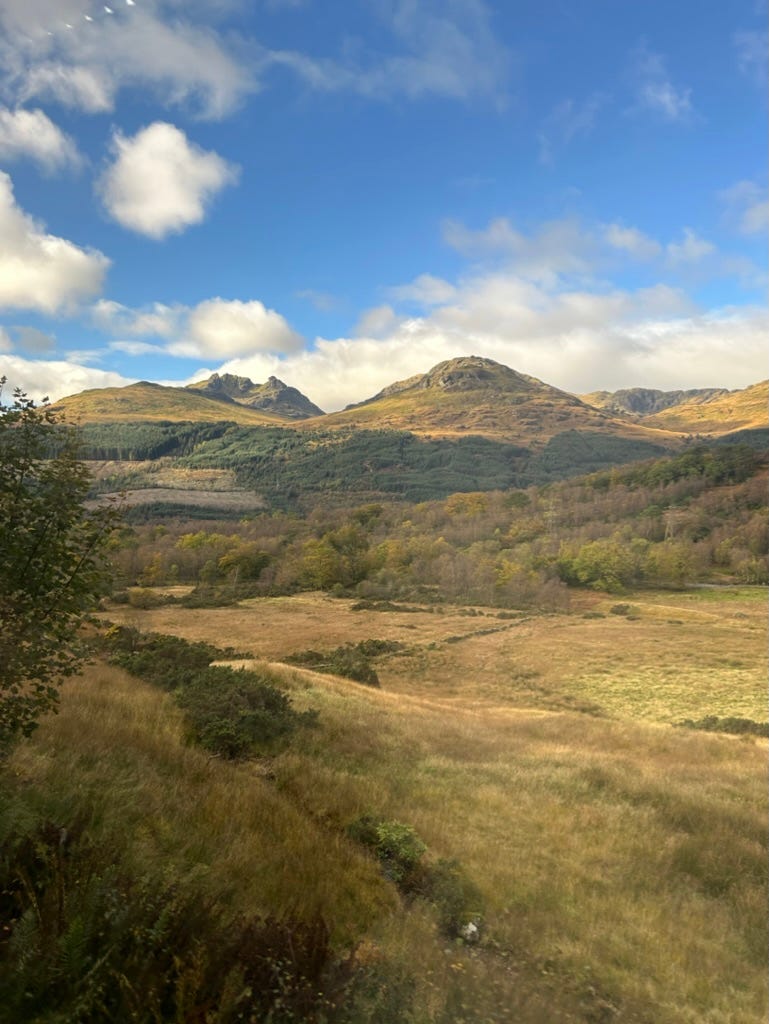
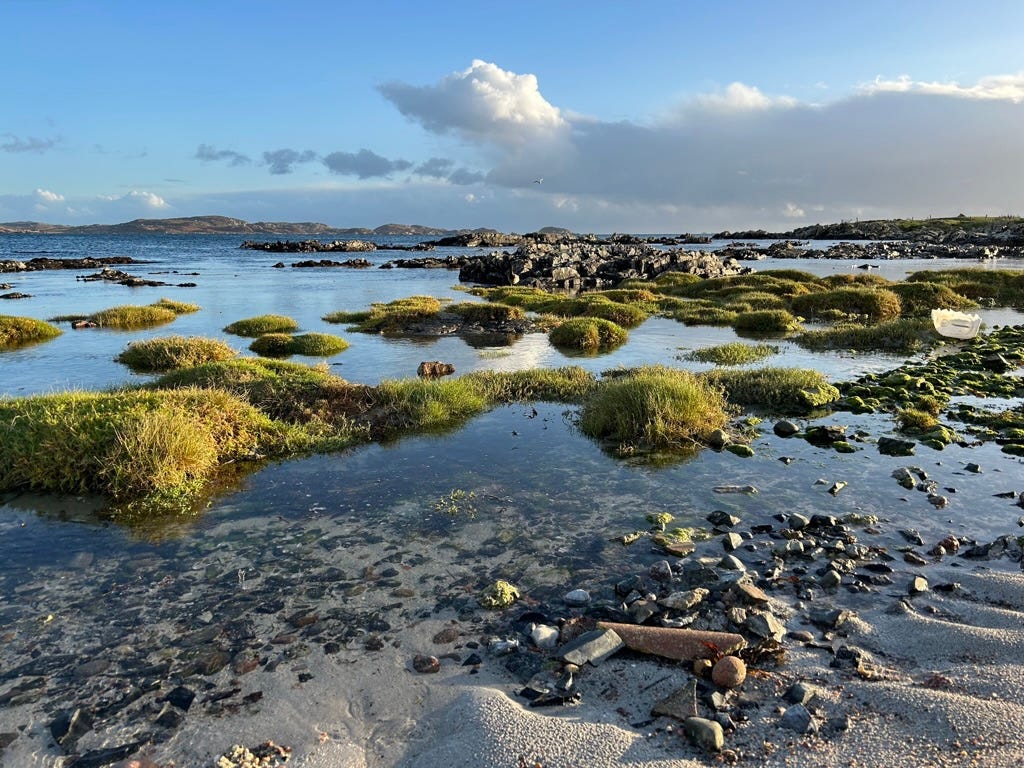


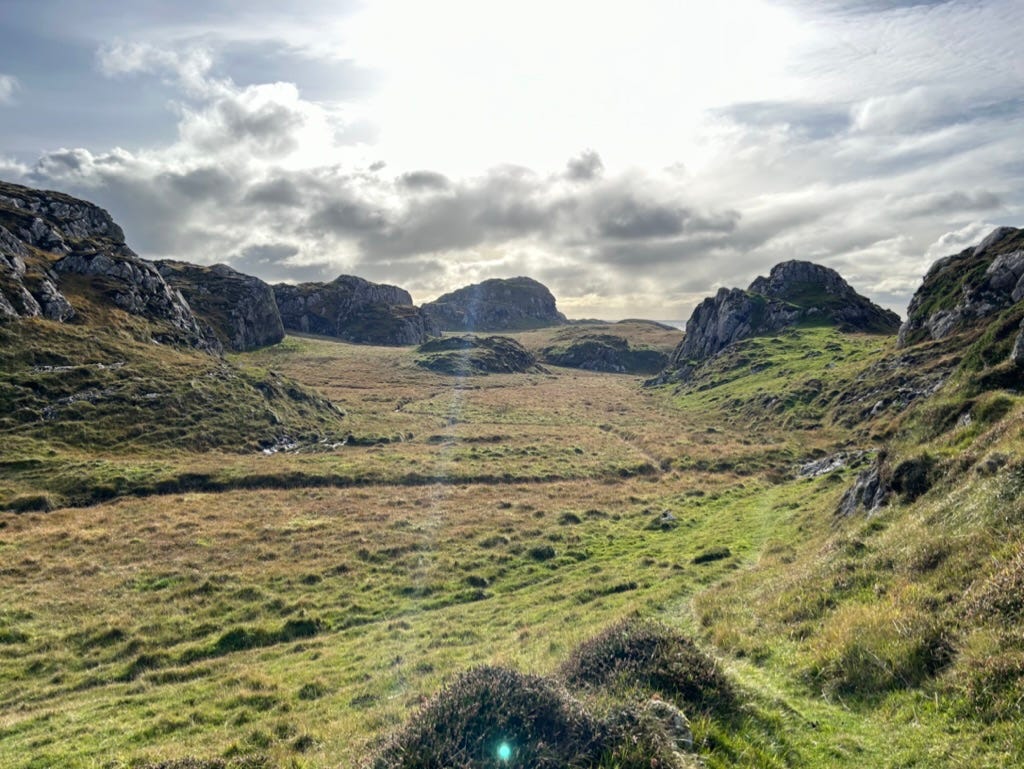
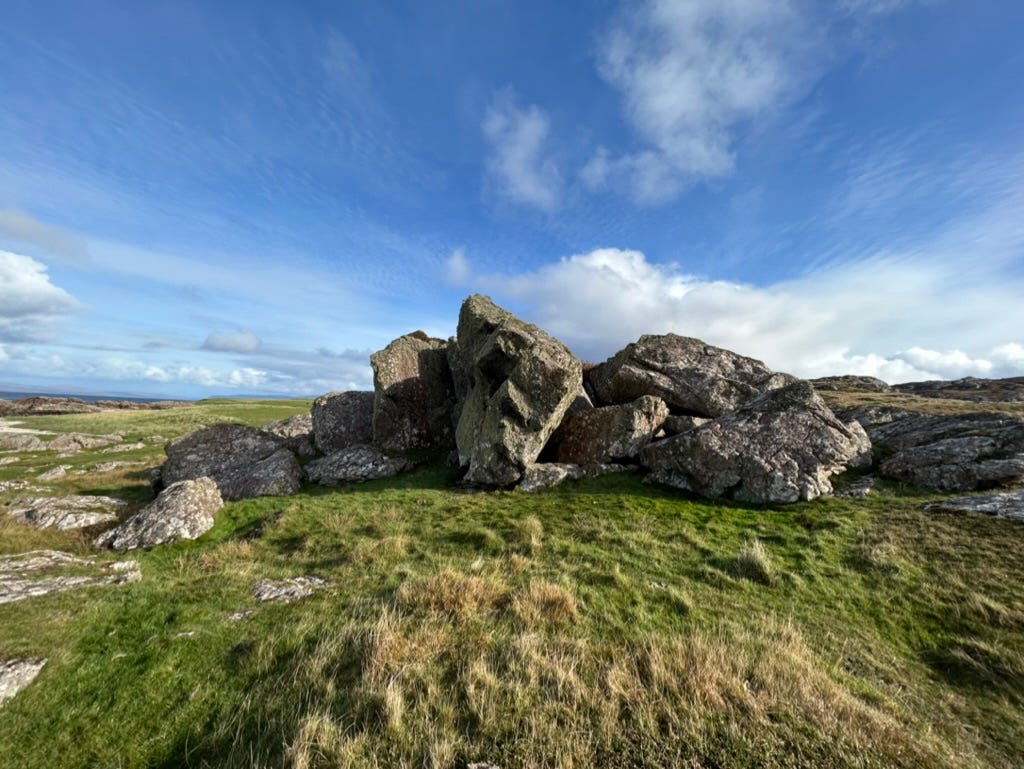

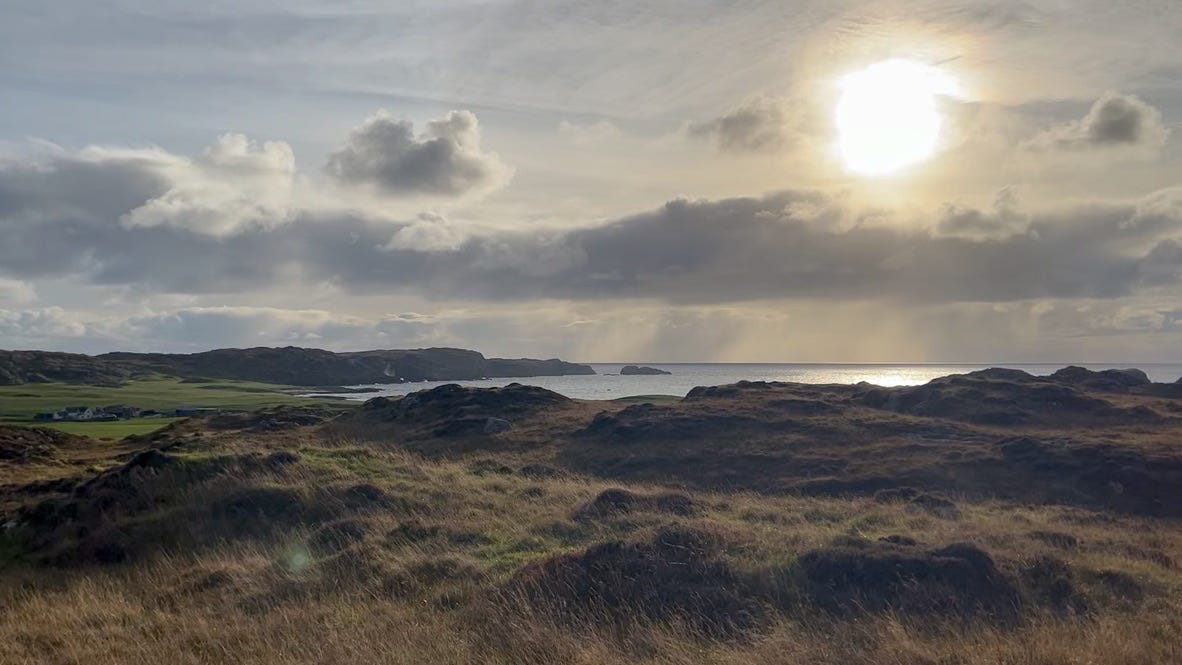
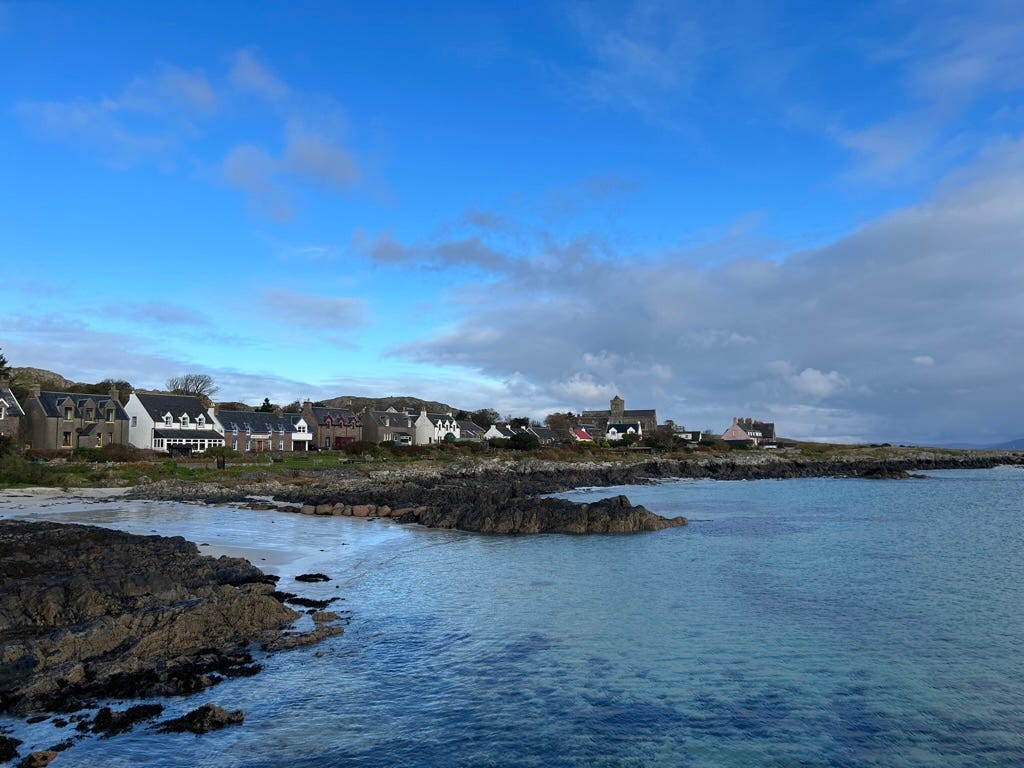
Beautiful Andrea. Thank you. Glad I could travel along with you. Your pictures make me feel like I'm there. Strange I was reading Start Where You Are by Pema before your post. It was an easy dovetail. I wonder what it's like back in California.